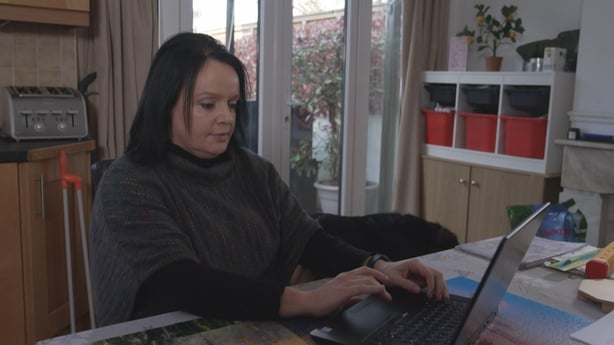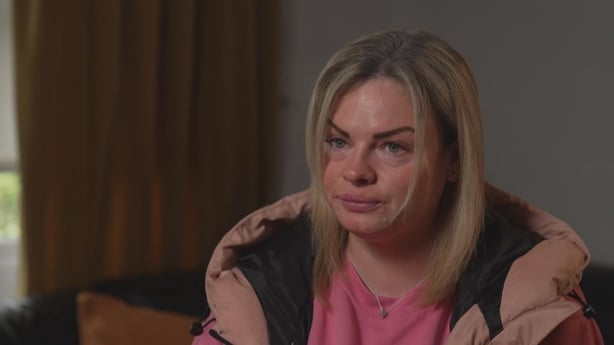"My eldest son, it's his birthday ten days after we leave here. He asks, 'Where will I have my party; where will I be?'. My other son, it's his Confirmation soon. It’s supposed to be a family event. He also asks, 'Where will I be'?"
These are some of the many questions Caroline Foy can’t answer just now.
She has a "notice to quit" her home in Dundrum, Co Dublin, which comes into effect in just over three weeks’ time, on 16 April. She is desperately searching for a new home for herself, a lone parent, and her two boys aged 12 and 13.
The Government says that lifting the eviction ban, reaffirmed in a Dáil vote last night, is the best way forward to safeguard tenants’ interests in the long term.
But Caroline says the looming deadline for her kids to leave their home in an area they have lived their entire lives, close to her parents, is already taking a huge toll on them.
"The two boys, they're struggling badly. They're anxious. I feel if it continues like this for us and so many other families, they're going to have to pour an awful lot of money into child mental health services."
Caroline has kept a close eye on the new measures that the Government announced in the last few days to see if she has any hope of staying on in her home. But, she says, there is "zero time" to see if they could be made to work for her.
For example, the expanded "tenant in situ" scheme which is to be made available to more tenants, only applies to those on the housing list and in receipt of rent support, such as the Housing Assistance Payment (HAP).
Unfortunately, Caroline is still waiting to hear from Dún Laoghaire-Rathdown County Council if she is eligible to be on the housing list and in receipt of the rent support, Housing Assistance Payment (HAP). This is despite that fact she applied in January, under new income thresholds.
"There is no time. If I got approved for the council list and to avail of the HAP payment, that would take at least six weeks to implement following that approval."
That’s three weeks after she is due to leave her home.

Another measure the Government announced for tenants like Caroline is "first refusal" to buy when the landlord is selling. However once again, this won’t be possible for Caroline. Currently paying a monthly rent of €2,000 she has not been able to save the necessary 10% deposit even if her landlady agreed to sell to her under a shared equity scheme with the council.
"They had the time, they had the foresight, they knew it was going to come to an end at some point."
The third main measure for tenants, who are not in receipt of rent support, is a scheme whereby the council or an approved housing body buys the property and rents to the tenant on a cost rental or non-profit basis.
But again, it remains to be seen how this will work. Prime Time asked the representative group of CEOs for all local authorities, the City and County Management Association (CCMA), if it is in a position to implement the newly announced measures in the coming weeks.
In response, it said: "The County and City Management Association is engaging with the Department of Housing on the detailed arrangements in respect of the measures announced this week and is not in a position to comment at this point."
Caroline Foy says it's just not good enough. The Government, she says, "should have worked harder and faster while the initial ban was in place".
"They had the time, they had the foresight, they knew it was going to come to an end at some point. They could have put these initiatives and schemes in place, brought the councils up to speed. They could all be rolled out by now. They have put nothing in place until a crisis hit. They may be lost of touch with what happens to people in their real life?"

Landlord Andrew Hickey from Tullow, Co Carlow, is also not convinced that the Government measures will be made to work by local authorities for landlords like him who are prepared to sell to them.
"It's pure lip service. I've experienced it first hand. That's the general feeling throughout the country. Very few houses have been purchased or looked at by the councils."
He is the owner of three rental properties and recently served notices to quit in all three houses. In two of the properties the tenants left, however, in one the tenant wishes to remain.
Despite putting this property on the market last year, the sale fell through as the buyer didn’t want to proceed with the tenant remaining on.
When Mr Hickey approached Carlow County Council, via a local councillor acting on his behalf, he was told that they weren’t interested in purchasing his property under the "tenant in situ" scheme.
Carlow County Council told Prime Time that since the scheme was introduced last year, it has purchased or gone "sale agreed" on 16 properties, judging each property on a case by case basis, including applications in Tullow.
However, Andrew Hickey remains unconvinced: "It's lip service. That's what that is. It's pure lip service. I've experienced it first hand. That's the general feeling throughout the country. Very few houses have been purchased or looked at by the councils."
Single mum Laura Harford - who is living in Old Bawn in south Dublin with her three boys - says with a notice to quit for Friday 31 March, she too has little faith that her local council is going to keep her in her home of the past nine years.
"You're fighting an absolute losing battle going down to the council, ringing them, nobody gets back in touch with you."
She has been on the housing list for ten years and says they haven't been able to help her since she received her eviction notice last August.
"If they haven't done anything in the past seven months or the past how many years?.. I can’t see them picking up any pieces now."
She says she has been going to the council and ringing their housing allocations department since she received a notice to quit last year.
"They don't answer the phone. I leave a voicemail, they don't come back to you. I email, they don't get back to you. You're fighting an absolute losing battle going down to the council, ringing them, nobody gets back in touch with you."

Laura has letters of support from the Child and Family Agency, Tusla, and the children’s charity Barnados which state that her family should be a priority for housing and should not be made homeless.
However this has made no difference. She believes she is facing into emergency accommodation or staying in a garda station.
"We shouldn't be there with the letters that the children have. It's not going to be good. I don't think any child should be subjected to that. I can only speak for my children and what they've been through this year and how much they've progressed."
She worries particularly about her youngest son who is seven and has been diagnosed with Attention Deficit Hyperactivity Disorder, or ADHD. It means he can physically act out if he is not in a calm space.
"I feel there would be a lot of conflict in a homeless hub," she said.
"So I feel that there's not going to be enough room for him to express himself, to do any of the things that he needs to do. I just think they will massively regress if they go into a homeless hub. It's my job as a parent to stop that from happening and to protect them."
Her two older sons keep asking the question she cannot answer: "Have we got a place yet mum?"
Asked if she has the heart to tell them, she shakes her head and begins to cry, "No I haven’t".







